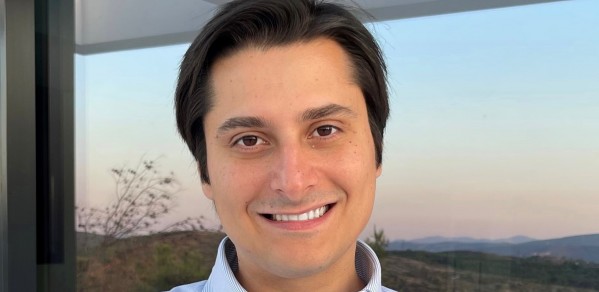
Dr Demetrios Lefas, Research Fellow at the Whittle Laboratory has received a Royal Academy of Engineering (RAEng) Research Fellowship to investigate how he can enable the design of future engine architectures by pushing the limits of jet engine design whilst preventing aeroelastic instability.
By pushing the limits of design whilst preventing aeroelastic instability, I aim to develop radical new jet engine technology at the pace required for our net-zero carbon transition.
Dr Demetrios Lefas
He is one of ten individuals from universities in the UK who have been revealed as recipients of the Royal Academy of Engineering Research Fellowships programme that supports outstanding early-career researchers to become future research leaders in engineering. The fellowships are designed to advance excellence in engineering by providing funding for five years to allow awardees the freedom to concentrate on fundamental research in any field of engineering.
Dr Lefas' research lies at the interface between aerodynamics and mechanical vibrations, tackling practical problems relating to aeroelastic instabilities found in jet engines.
Aeroelastic instabilities in jet engines occur when changes in aerodynamics amplify a fan blade’s vibration. Such instabilities, currently limit jet engine design and compromise engine efficiency. It is critical that such problems are addressed quickly to ensure the successful development of new ultra-efficient engines. Dr Lefas’ research aims to understand the driving mechanisms behind these aeroelastic instabilities to develop new technology at the pace required for a net-zero carbon transition, while keeping flying accessible to all.
On receiving the award Demetrios commented:
"I am thrilled and honoured to receive the support of the Royal Academy of Engineering Research Fellowship. This Fellowship will give me the independence and freedom to understand the driving mechanisms behind aeroelastic instabilities that limit current jet engine design and if found late in an engine development programme result in large delays and cost hundreds of millions of pounds to fix. By pushing the limits of design whilst preventing aeroelastic instability, I aim to develop radical new jet engine technology at the pace required for our net-zero carbon transition.”
Asked on what currently limits jet engine fan blade design Demetrios said:
"Traditionally aerodynamics and vibrations have been considered in isolation from one another both in academia and industry. Therefore, a gap currently exists at this interface between aerodynamics and vibrations. However, both play a key role in determining the final 3D shape and efficiency of fan blades and should be considered simultaneously in the design of future ultra-efficient jet engines.
On how he aims to make an impact as an RAEng Research Fellow Demetrios explained:
"This fellowship gives me the unique opportunity to bridge the gap between aerodynamics and vibrations as an academic at Cambridge’s Whittle Laboratory and a visiting academic at Imperial College London; the centres of excellence for Aerodynamics and Vibrations respectively. Aligning the research of these two world-leading institutions and my ongoing direct collaboration with Rolls-Royce, provides the ideal platform to have a real impact on future engine development.
It is only through the support of the Royal Academy of Engineering that such a unique collaboration has been made possible. I hope to use this opportunity to become a future leader in solving engine aeroelasticity problems for years to come!"
In addition to direct financial support, the scheme provides an opportunity to establish a research track record and, in turn, to be in a stronger position to apply for additional funding and grow a research team. Awardees also benefit from mentoring support from an Academy Fellow on research and career development as well as reduced teaching and administrative duties to allow time for research, training opportunities and networking with other Research Fellows and Academy Fellows.

